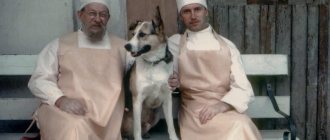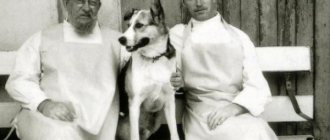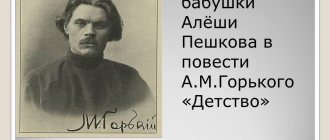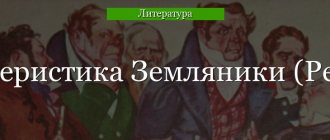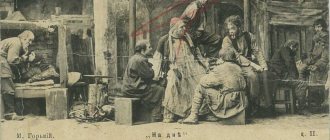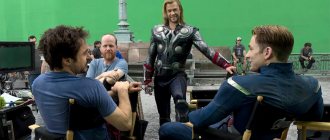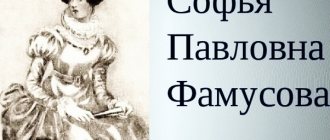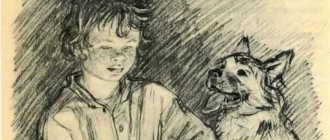- Essays
- On literature
- Bulgakov
- The image and characteristics of Professor Preobrazhensky in the story Heart of a Dog
The action of the work takes place in 1924, in the city of Moscow. The main character of the story is the luminary of medicine, 60-year-old surgeon, world-famous professor Preobrazhensky Philip Philipovich.
Doctor Preobrazhensky lives with his servants in an apartment of seven rooms. Philip Philipovich is a practicing doctor. He sees patients all day long. He devotes the evening to reading medical literature. The professor's life is quite settled. He was not used to denying himself comfort and good nutrition. The doctor, a lover of delicious food, always has pickles and delicacies on his table.
The professor devotes his entire life to healing people. He works hard and fruitfully. This allows him to lead the lifestyle to which he is accustomed. And he does not intend to change the habit of living well, despite the fact that times were hard and hungry.
In parallel with his medical practice, Philip Philipovich is also engaged in science. He is very attracted to eugenics - the science of longevity. Through experience, the doctor is trying to solve the problems of rejuvenating the body and making a discovery in the field of prolonging human life. Following his goal, Preobrazhensky performs surgery on the stray dog Sharik. He transplants a human pituitary gland into the “patient.” Either because the pituitary gland belonged to a worthless creature suffering from alcoholism, or because nature does not tolerate interference, the experiment had a disastrous result.
A smart, educated, intelligent professor faced a lot of problems. The dog he operated on turned into a rude, ill-mannered man suffering from alcoholism. Driven to despair, Philip Philipovich was forced, together with his assistant Dr. Bormental, to perform a new operation. The unbearable “tenant” Sharikov again became the dog Sharik.
Through the images of Preobrazhensky, Bormental, Sharikov, Shvonder and the “house committee”, Bulgakov wants to convey his point of view to the reader. He, just like the professor, does not understand and does not accept the revolution. He doesn’t like the proletariat and doesn’t hide it. He does not understand and does not like the people from the house committee, who, in his opinion, act irrationally.
According to the doctor, devastation primarily “sits” in the heads of those who, trying to build a new life, destroy everything around them. It is impossible to create a new adequate society by destroying culture and way of life. Instead of creating, “Sharikovs” and “Shvonders”, who have become household names, are not capable of anything except destruction and chaos.
Essay Characteristics and image of Professor Preobrazhensky
Bulgakov's story describes the period of life in Russia at the beginning of the 20th century. The reality of that time, the time of the birth of the proletariat, when people received power, but did not yet know how to use it, was vividly and colorfully reproduced.
At the center of the story is Professor Preobrazhensky, a true representative of the intelligentsia, a figure on a global scale. Philip Philipovich lives in an apartment of seven rooms, and he would like to have one more. He is right about this; he not only lives in his apartment, but also works. This is a normal desire of a normal person to have an apartment that satisfies his needs. Preobrazhensky is doing the right thing when he kicks out the representatives of the house committee who want to take away the apartment. They can’t even enter like a human being, nor take off their shoes, nor say hello. The professor simply put them in their place.
The doctor practices medicine, earning his living and maintaining an apartment with servants. Philip Philipovich believes that a person should live and eat normally, have good things and the opportunity for cultural development.
If he is a professor, it means he received a decent education, besides, he comes from an intelligent environment, and he has an excellent upbringing. His skill as a doctor allows him to perform complex operations. Through many trials and experiments, Preobrazhensky comes to the conclusion that he performs an operation on a dog, implanting a human pituitary gland into it. The operation is successful, and the dog gradually turns into a human. The only thing that the doctor did not foresee was that the new person resulting from the dog would absorb all the negative qualities of the donor. Having no teaching experience, the professor understands that he cannot re-educate Sharikov. The doctor goes the opposite way, performs the operation again, returning Sharikov to his original image. Preobrazhensky is right that “speaking does not mean becoming a person.”
But the professor is a very hardworking person, he carries out painstaking work, experimenting and improving, and his intelligence and confidence inspire hope that he will make many discoveries in the field of medicine for the benefit of society. A sober and sensible person, Preobrazhensky first of all strives for order, not only external, but also order in thoughts. A representative of the aristocracy, the doctor embodies the symbol of Russian culture, over which the threat of destruction hangs.
As usual, in Bulgakov's works, reality merges with fantasy.
Image and characteristics of Preobrazhensky
Doctor Preobrazhensky lives with his servants in an apartment of seven rooms. Philip Philipovich is a practicing doctor. He sees patients all day long. He devotes the evening to reading medical literature.
The professor's life is quite settled. He was not used to denying himself comfort and good nutrition. The doctor, a lover of delicious food, always has pickles and delicacies on his table.
The professor devotes his entire life to healing people. He works hard and fruitfully. This allows him to lead the lifestyle to which he is accustomed. And he does not intend to change the habit of living well, despite the fact that times were hard and hungry.
In parallel with his medical practice, Philip Philipovich is also engaged in science. He is very attracted to eugenics - the science of longevity. Through experience, the doctor is trying to solve the problems of rejuvenating the body and making a discovery in the field of prolonging human life.
Following his goal, Preobrazhensky performs surgery on the stray dog Sharik. He transplants a human pituitary gland into the “patient.” Either because the pituitary gland belonged to a worthless creature suffering from alcoholism, or because nature does not tolerate interference, the experiment had a disastrous result.
A smart, educated, intelligent professor faced a lot of problems. The dog he operated on turned into a rude, ill-mannered man suffering from alcoholism.
Driven to despair, Philip Philipovich was forced, together with his assistant Dr. Bormental, to perform a new operation. The unbearable “tenant” Sharikov again became the dog Sharik.
Through the images of Preobrazhensky, Bormental, Sharikov, Shvonder and the “house committee”, Bulgakov wants to convey his point of view to the reader. He, just like the professor, does not understand and does not accept the revolution. He doesn’t like the proletariat and doesn’t hide it. He does not understand and does not like the people from the house committee, who, in his opinion, act irrationally.
According to the doctor, devastation primarily “sits” in the heads of those who, trying to build a new life, destroy everything around them. It is impossible to create a new adequate society by destroying culture and way of life. Instead of creating, “Sharikovs” and “Shvonders”, who have become household names, are not capable of anything except destruction and chaos.
Option 3
After reading the story “Heart of a Dog,” I decided to highlight the image of Professor Preobrazhensky, whom the author represents as Moscow’s Victor Frankenstein. Having set his sights on searching for rejuvenation, and perhaps eternal life, the professor faces some problems.
Philip Philipovich Preobrazhensky is a professor of medical sciences, a practicing surgeon and a representative of the aristocracy. He is used to living comfortably and in abundance, and therefore constantly argues and swears with representatives of the house committee. Shvonder and company are trying to take away the professor’s apartment, in which he not only lives, but also works. That is why, having 7 rooms in his apartment, he wants one more.
For his services in medicine he has some privileges and immunity. He does not like the proletariat and does not hide it. According to the professor, devastation is primarily in the minds of those who, trying to build a new world, destroy the old one.
The professor is studying the possibility of rejuvenating people. Conducting experiments and studying scientific literature, he tries to understand whether rejuvenation is possible. To answer this question, he brings home the stray dog Sharik. He treats him, fattens him, and then performs an operation to replace the canine pituitary gland with a human one. As a result of the operation, Sharik humanized and became Sharikov, but he could not become a worthy person. He learned to walk on two legs, began to speak and wear clothes, in a word, he looked like a person. However, the ability to speak and walk on two legs did not make him a worthy representative of society. After all, without education, manners and the desire to learn new things, a person becomes inferior.
Sharik, having become a man, began to drink, swear and did not want to study. The professor, faced with a pedagogical problem and an inability to re-educate, decided to carry out the reverse operation. After an unsuccessful attempt to rejuvenate the body, the professor realizes that it is better not to argue with nature. He admits to the public that his experiments were a “fiasco.” Thus, having lost part of his outstanding reputation, he hides his greatest achievement before humanity.
Professor Preobrazhensky is a sober and sensible person. Therefore, he strives for order not only in his apartment and life, but also in his soul and thoughts. Philip Philipovich Preobrazhensky in the story “The Heart of a Dog” personifies the entire aristocracy, over which at that time the threat of destruction hung.
Brief summary of the work
It is believed that the image of the main character was taken from life . The prototype of the professor was Bulgakov’s uncle, but he was a gynecologist.
Professor Philip Philipovich Preobrazhensky saw a dying dog and picked him up. The dog was given the nickname Sharik.
The scientist was engaged in research in the field of human rejuvenation. His assistant was Dr. Ivan Bormenthal. He was happy that he could work under such a talented and famous scientist as Preobrazhensky.
Ivan was not rich. The professor helped and supported a capable student as a student, which is why he was grateful to him and did his work flawlessly.
In his diary, Bormenthal describes all the events that happened to the dog during the experiment. The experiment took place in the apartment where the scientist lived.
The animal suddenly turned into a human. This created a number of problems in Preobrazhensky's apartment. The subhuman had a violent character and antisocial tendencies of his donor.
The professor realized that he had made a mistake in his experiment, but did not dare to correct the situation . He could not cope with the arrogant and ill-mannered test subject. During this period, Bormenthal showed strength of character and showed devotion to Preobrazhensky. He moved to the professor in order to protect him from the violent Sharikov, and pacified the human dog.
One day, Ivan suggested that the professor get rid of the experimental subject, since it was just a failed experiment. But Preobrazhensky abandoned this idea, as he was worried about the freedom and reputation of his student.
He saw in him not only a worthy assistant and friend, but also a gifted specialist, calling him “the future Professor Bormenthal.”
Essay 4
Bulgakov's story "The Heart of a Dog" became the author's last satirical work. For sixty long years it was banned in the Soviet Union. Nowadays, there is probably not a person who has not read or seen the film of the same name directed by Bortko. The role of Professor Preobrazhensky was played by the most talented actor Evgeny Evstigneev.
The genre is fantasy based on real events. Moscow in the twenties of the last century. There is devastation, hunger, dirt all around. The external and internal state of people matches the events. The new government has nothing to offer its people other than depression. And in parallel, the author describes a completely different life.
Philip Filippovich Preobrazhensky is a professor of medicine, a famous scientist in Europe, an intellectual of more than one generation, a man accustomed to working all his life - this is the main character of the work. The professor is obsessed with the idea of rejuvenation and has been quite successful in this. The talented young doctor Bormental helps him.
Throughout the story, Philip Philipovich teaches moral lessons to his assistant. The professor himself does not welcome the Soviet way of life and is fundamentally not interested in politics. He treats those at the helm, in return they allow him to lead the lifestyle to which he is accustomed. The professor lives in a seven-room apartment with all amenities, eats healthy, high-quality food, has a servant and does not miss a single premiere at the theater. His life can be envied, because he sincerely believes that work and knowledge make a person happy, despite the circumstances.
But in essence, the professor did not yet fully understand the Soviet regime; he did not see how families and human destinies were destroyed. The policeman, according to Philip Philipovich, could immediately restore order if he wanted.
One event changed the professor's consciousness. Having picked up a stray dog on the street, the professor decided to conduct his experiment on it to “improve human nature.” As a result, instead of a good dog, a monster with a human heart, Klim Chugunkin, appeared. Horrified by his own experiment, Philip Philipovich, cursing himself at all costs, renounces such activity. He understands that you cannot interfere with human nature. After all, “any woman can give birth to a genius.”
Mikhail Bulgakov, in his story “The Heart of a Dog,” touched on moral issues that always confronted people in any era. He wrote about progress in an era of terror and moral decline. Today we are reading “The Heart of a Dog” with interest, because the questions raised by the author are relevant for modern people trying to live in harmony and happiness.
Description of the main character
Bulgakov touches on the topic of power and raises the problem of human ignorance . The author understands that one cannot forcibly change the order both in history and in life. The results of the experiment showed the most terrible diseases of society.
Character, appearance and views
Prof. Preobrazhensky is smart, rich, hardworking and attentive, but at the same time he is quick-tempered and unrestrained. For five years he studied the functioning of the human brain and organs from the inside. The character knows the value of a spoken word and keeps it. The hero's honesty and law-abiding personality captivates the reader.
Professor Preobrazhensky's favorite pastime is singing. He likes the opera Aida. He helps people of different classes, but at the same time does not like the proletariat. His help to society is revealed in the episode with Bormenthal, when the professor sheltered a half-starved student. After reading the story, you can identify the main character traits of Philip Philipich:
- intelligence and education;
- attentiveness;
- hot temper;
- hard work;
- honesty;
- empathy.
Preobrazhensky conducts experiments on people and animals. He teaches the dog to speak, tries to explain to it what morality and culture of behavior in society are.
In this episode, the author shows that it is impossible to forcibly cultivate people and make them educated. Society must consciously develop and strive for improvement.
The scientist treats representatives of the new government and narrow-minded people with humor and sarcasm. He sees that they have the characteristics of his experimental subject. Also, using the example of the created human animal, the doctor and Preobrazhensky notice how quickly people like the image of Sharikov adapt. They instantly adapt to their surroundings, faster than most educated people and even the professor himself.
The role of Bormenthal in the fate of a genius
The professor is a real genius. It is difficult for such people to make their way alone. Bormenthal is his guardian angel. The whole process rests on it. The doctor selflessly devotes himself entirely to this experience, keeps notes on the changes, and is ready to back up the scientist at any moment.
Preobrazhensky saw in the talented student a thirst for knowledge, responsibility and decency, so he sheltered him, got him a place to study, and then gave him a job. In gratitude, Bormenthal gave his life to the success of others. Fame did not touch him.
The story contains a reference to a violent change in society and its way of life. This will most likely lead to negative results. Bulgakov put the following idea into his work : any artificial intervention (in nature, history, society, politics) will have a disastrous effect.
The story teaches us to be more prudent and restrained in our desires. People must respect all living things, do responsible and high-quality work, fight for their rights, and demand that government officials fulfill their promises.
Login to the site
The film “Heart of a Dog” based on the work of the same name by M. Bulgakov was first shown on Central Television of the Soviet Union on November 19, 1988. As far as I remember, it became a very important film event. The entire population of the USSR clung to the blue screens, following the vicissitudes of the dog Sharik in the guise of citizen Sharikov. But the main character was the professor, who performed the miracle of transformation. But I was captivated not so much by the plot as by the apt and caustic characteristics of our, as it seemed to us then, Soviet reality. Professor Preobrazhensky was performed by People's Artist Evgeny Evstigneev, and so vividly that it is difficult to imagine anyone else in this image (although there is another, foreign film, Heart of a Dog). Evgeny Evstigneev was so wise and convincing in this role. The other day, Evgeny Aleksandrovich Evstigneev ( October 9, 1926, Nizhny Novgorod, RSFSR, USSR - March 4, 1992, London, Great Britain) would have celebrated its 90th anniversary. But for us, the audience, he remains alive in the film roles he embodied, and above all in the role of Professor Preobrazhensky. Such venerable actors as Leonid Bronevoy, Mikhail Ulyanov, Yuri Yakovlev, Vladislav Strzhelchik fought for the right to play Professor Preobrazhensky in the film directed by Vladimir Bortko, but Evgeny Evstigneev won. Despite the fact that Evgeniy Aleksandrovich had not read the story “Heart of a Dog” before working on the film, he was so natural in the role of Philip Philipovich that this work became one of the best in his film career. The actor’s son, famous cameraman, director and producer Denis Evstigneev recalled: “This film appeared in my father’s life at the right time and literally saved him. Dad was going through a difficult period when he was sent into retirement at the Moscow Art Theater. Having a hard time agreeing to work in “Heart of a Dog,” he then simply lived it. I don’t know what happened on the set, but he constantly talked about his role, played something, showed some scenes... At that moment, the picture became a support for him.”
This post presents a quotation image and characterization of Professor Preobrazhensky in the story “Heart of a Dog”, i.e. a description of the appearance and character of the hero in quotes from the story, but Evgeny Evstigneev, who plays this role, is still figuratively represented. So: The full name of the hero is Philip Philipovich Preobrazhensky: “...I wish you good health, Philip Philipovich...” “...Are you kidding me, Professor Preobrazhensky?..” Professor Preobrazhensky’s age is 60 years: “... I’m 60 years old, I can give you advice...” Professor Preobrazhensky’s father was a cathedral archpriest: “...Father is a cathedral archpriest...”
Appearance of Professor Preobrazhensky: “... gentleman, with a French pointed beard and a mustache, gray, fluffy and dashing, like the French knights, but the smell from him flies through the snowstorm, like a hospital. And a cigar...” “...straightened his fluffy mustache in front of the mirror on the wall...” “...Kick me with your felt boots, I won’t utter a word...” “...helped take off a heavy fur coat on a black-brown fox with a bluish spark...”
“...After taking off his fur coat, he found himself in a black suit of English cloth, and on his stomach a gold chain sparkled joyfully and dimly...” “...with eyes shining like the gold rims of his glasses, he watched this procedure...” “... The nostrils of his hawk nose flared. ..." "...His hawk nostrils flared..."
“... His trimmed gray hair was hidden under a white cap...” “... Philip Philipovich spread his short fingers wide...” “... Philip Philipovich’s face became scary. He bared his porcelain and gold crowns..." "...he laughed so hard that a golden picket fence sparkled in his mouth...” “...a heavy thought tormented his learned brow with licks...” (vzliz - receding hairline)
“...Philip Philipovich was in his azure robe and red shoes...” (at home) “... He came out in the well-known azure robe...” “... kissed his fluffy, heavily smoky mustache...” “... Preobrazhensky patted himself on the steep and prone to paralysis neck..." Professor Preobrazhensky's voice is thunderous, like a trumpet: "...Nothing like that! - Philip Philipovich answered in a thunderous voice..." "...his voice, like a command trumpet, resounded throughout the entire home..." Professor Preobrazhensky is an imperious and energetic person: "...The former imperious and energetic Philip Philipovich, full of dignity, appeared before the night guests..." Professor Preobrazhensky is a man with character: “..“This guy,” the dog thought in delight, “is all like me.” Oh, he'll bite them now, oh, he'll bite them. I don’t know yet - in what way, but it bites like that..." Professor Preobrazhensky is a hot-tempered person: "... said Philip Philipovich, - my dear, I sometimes yell at you during operations. Forgive the old man's temper..." Professor Preobrazhensky is a man of his word: "...I never talk into the wind, you know that very well..."
Professor Preobrazhensky is an honest man. He does not abandon his colleagues in trouble: “... abandoning a colleague in the event of a catastrophe, but jumping out at global significance, excuse me...” Professor Preobrazhensky worked at the department at the university: “... Philip Philipovich,” he exclaimed passionately, “I will never forget how I came to you as a half-starved student, and you gave me shelter at the department..." Professor Preobrazhensky is a member of the All-Russian Surgical Society: "... if there was no “Aida” at the Bolshoi Theater and there was no meeting of the All-Russian Surgical Society, the deity was placed in the office in a deep chair... »
Professor Preobrazhensky is a world-famous surgeon: “...Philip Philipovich, you are a figure of world significance...” “... if you weren’t a European luminary...” “..“ Has no equal in Europe... By God!”, he thought vaguely Bormenthal..." "...Prof. Preobrazhensky, you are a creator...” Professor Preobrazhensky is an outstanding personality and a great scientist: “..“but an outstanding personality...” “...You are a great scientist, that’s what! - said Bormenthal..." "...Do you really think that I produce them because of money? After all, I’m a scientist after all...” Preobrazhensky conducts incredible experiments on people and animals: “... So that one fine day he can turn the sweetest dog into such scum that his hair stands on end...” Perhaps the author’s prototype for Professor Preobrazhensky was his uncle, brother mother, Nikolai Mikhailovich Pokrovsky, gynecologist. His apartment coincides in detail with the description of Philip Philipovich's apartment, and, in addition, he had a dog. This hypothesis is also confirmed by Bulgakov’s first wife, T.N. Lappa, in her memoirs “When I started reading “The Heart of a Dog,” I immediately guessed that it was him. Just as angry, he was always humming something, his nostrils flared, his mustache was just as bushy. He was then very offended by Mikhail for this. Nikolai Mikhailovich was distinguished by an inflexible, hot-tempered character.” However, the similarities are limited to these details. Pokrovsky did not conduct scandalous experiments
. Several real doctors are named as prototypes for the literary character of Professor Preobrazhensky.
Sergei (Samuel) Abramovich Voronov (July 10, 1866, Voronezh, Russian Empire - September 3, 1951, Lausanne, Switzerland) was a French surgeon of Russian origin. He became famous for his technique of grafting monkey testicular tissue onto human testicles, which he developed in France in the 1920s and 1930s. However, his work soon fell out of favor and he became a target of ridicule. At the end of the 19th century, Voronov injected an extract of ground dog and guinea pig testicles under his skin. These experiments did not live up to his hopes of increasing hormonal levels to delay the aging process. Voronov's remaining experiments were a continuation of this initial experiment. He continued with transplanting the testicles of executed criminals into millionaires, and when demand exceeded his ability to supply, he began using tissue from monkey testicles. From the Illustrated Magazine "Sparks Sunday", dated June 29, 1914: Sensational discovery. At the French Medical Academy, our compatriot, Dr. Sergei Voronov, made a sensational report about the operation he performed in his clinic on a 14-year-old idiot boy. From the age of six, this boy’s mental development stopped, and all the signs of abnormality and cretinism were clearly visible: a dull look, dullness and lack of understanding of the most ordinary things. Voronov inoculated this boy with the thymus gland of a monkey. The success exceeded expectations. The boy's eyes came to life, mental abilities, understanding, and curiosity appeared.
Alexey Andreevich Zamkov (1883 - October 25, 1942, Moscow) - Russian, Soviet doctor, surgeon, therapist, urologist, creator of the world's first industrial hormonal therapy drug "Gravidan". Husband of the famous Soviet monumental sculptor Vera Mukhina (married in 1918). He gained fame after the drug Gravidan, created by him in 1929, in clinical trials (on Red Army soldiers) gave a noticeable positive effect in the treatment of a number of diseases. Famous Soviet politicians and cultural figures - Molotov, Kalinin, Clara Zetkin, Maxim Gorky and others - became Zamkov's patients. In 1938, his institute was disbanded. Zamkov became seriously ill, he had a heart attack, and 4 years later a second one, after which he died at the age of 59. He was buried in Moscow at the Novodevichy cemetery. At the grave there is a monument made by his wife, Vera Mukhina, with the inscription: “I did everything I could for the people.”
Ilya Ivanovich Ivanov (July 20 [August 1] 1870, Shchigry, Kursk province - March 20, 1932, Alma-Ata) - Russian and Soviet biologist with specialization in the field of artificial insemination and interspecific hybridization of animals. He took part in attempts to breed a hybrid of humans with other primates. He conducted experiments on artificial insemination of female chimpanzees with human sperm, and made attempts to inseminate women with monkey sperm in Sukhumi. As part of the political purge in the Soviet scientific community, Gorbunov was exiled to Alma-Ata, where he worked, retaining the title and position of professor at the Kazakh Veterinary and Zootechnical Institute until his death from a stroke on March 20, 1932.
- And about the “dad” - you’re wrong. Did I ask for an operation? A good thing: they grabbed the animal, slashed its head with a knife... But maybe I didn’t give my permission for the operation. And so do my relatives. I may have the right to file a claim. - Explain to me, please, why it is necessary to artificially fabricate Spinoza, when any woman can give birth to him at any time? “Humanity itself takes care of this and, in an evolutionary order, every year persistently, singling out all kinds of scum from the masses, creates dozens of outstanding geniuses who adorn the globe. “Realize that the whole horror is that he no longer has a dog’s heart, but a human one.” And the lousiest of all that exists in nature.
Professor Preobrazhensky is a hardworking person: “...Doors opened, faces changed, tools rattled in the closet, and Philip Philipovich worked tirelessly...” “...After all, I sat for five years, picking appendages out of brains... You know what kind of work I did - it’s incomprehensible to the mind...” Professor Preobrazhensky is a man of facts and observations: “...Dear, do you know me? Is not it? I am a man of facts, a man of observation. I am an enemy of unfounded hypotheses. And this is very well known not only in Russia, but also in Europe. If I say something, it means that there is some underlying fact from which I draw a conclusion...”
Professor Preobrazhensky is a persistent scientist. He is always exploring something: “... An important man dipped his hands in slippery gloves into a vessel, took out brains - a stubborn man, persistent, always achieving something, cutting, examining, squinting and singing...” Preobrazhensky - teacher and friend of the doctor Bormental: “...That’s it, Bormental, you are the first student of my school and, moreover, my friend, as I was convinced today...”
Preobrazhensky is familiar with important officials: “... if you were not a European luminary, and you would not have stood up for you in the most outrageous way <...> persons, whom, I am sure, we will explain later, you should have been arrested...” The first edition of “Heart of a Dog” "contained almost open allusions to a number of political figures of that time, in particular to the Soviet plenipotentiary representative in London Christian Rakovsky and a number of other functionaries known in the circles of the Soviet intelligentsia for their scandalous love affairs
Professor Preobrazhensky is a wealthy man: “...However, he apparently doesn’t have a lot of money anyway...” Professor Preobrazhensky lives in Moscow: “...Since 1903 I have lived in this house. And so, during this time, until March 1917, there was not a single case...” Preobrazhensky lives in the “Kalabukhov house” on Prechistenka: “...Did Karl Marx say somewhere that the 2nd entrance of the Kalabukhov house on Prechistenka should be blocked up boards..."
Moscow, Prechistenka street, 24/1 (“Kalabukhovsky house”). Architect Semyon Kulagin. 1904 It is generally accepted that the main prototype of Professor Preobrazhensky’s home was the apartment building 24/1 on the corner of Prechistenka and Obukhov Lane, built according to the design of architect S. F. Kulagin in 1904 on a plot owned by E. S. Pavlovskaya. The house is a five-story massive structure with rusticated cladding on the first floor. On the facade facing Obukhov (from 1922 - Chisty) lane, there are two high windows connecting the second and third floors. Several windows along the facade on Prechistenka are decorated with porticoes with half-columns. At the beginning of the 20th century, two of Bulgakov’s maternal uncles lived in this house - doctors Nikolai Mikhailovich and Mikhail Mikhailovich Pokrovsky. The first of them became the main prototype of F. F. Preobrazhensky. In the Moscow address books of the pre-revolutionary and first post-revolutionary years, the same address of the brothers is listed differently: “N. M. Pokrovsky - women’s diseases - Obukhov Lane, 1, apartment 12” and “M. M. Pokrovsky - venereal diseases — Prechistenka, 24, apartment 12.” In the film version of “Heart of a Dog”, filmed in Leningrad, the role of “Kalabukhovsky” was played by house 27-29 on Mokhovaya Street - a former apartment building of the Rossiya insurance company, built in the French Renaissance style according to the design of the architect L. N. Benois at the end of the 19th century - the beginning of the twentieth century.
Petersburg, st. Mokhovaya, 27-29 Preobrazhensky lives in a 7-room apartment. This is where he works: “...You live alone in seven rooms...” “...I live and work alone in seven rooms,” answered Philip Philipovich, “and I would like to have an eighth. I need it for the library...” - Zina, there in the reception area... Is she in the reception area? — In the waiting room, green as vitriol. - Green book... - Well, fire now. It's official, from the library! - Correspondence - it's called what's his name... Engels with this devil... To the stove! Moscow local historian and Bulgakov expert B. S. Myagkov points out that Pokrovsky’s apartment initially had five rooms, but after the arrival of his nieces in 1920, one of the large rooms was partitioned off, resulting in seven rooms. Pokrovsky’s nieces, Alexandra Andreevna and Oksana Mitrofanovna, lived in this apartment until the end of the 1970s. Pointing out that the description of Professor Preobrazhensky’s seven-room apartment coincides in detail with Pokrovsky’s apartment, B.V. Sokolov makes the observation that “in the address of the prototype, the street names are associated with the Christian tradition, and his surname (in honor of the holiday of the Intercession) corresponds to the character’s surname associated with the feast of the Transfiguration of the Lord." The lobby of the “Kalabukhov house” with a marble main staircase and the mezzanine, where Preobrazhensky’s “luxurious apartment” was located, were borrowed by Bulgakov from the building 13/7, building 1, which stood opposite, at the intersection of Prechistenka and Lopukhinsky Lane.
Apartment house J. A. Rekka. Moscow, Prechistenka, 13/7 The impressive building at 13 Prechistenka Street in Moscow, on the corner with Lopukhinsky Lane, was built in 1911 by order of a trade and construction company managed by the “developer” Yakov Rekka. The project was developed by architect G.A. Gelrich in the Moscow Art Nouveau style. The house has a luxurious exterior: the first two floors are lined with relief masonry; the facade is decorated with stucco decorations; faceted forms of bay windows; balustrades on arched loggias. In addition, the house has a landscaped courtyard.
Before the revolution, two apartments on the last, sixth floor of the house were occupied by a relative of the Faberge jeweler Alexander. The surname of Anna Frantsevna Fougere, the jeweler from The Master and Margarita, is consonant with the surname of Faberge. Although she “lived” in an apartment on Bolshaya Sadovaya, 10 (the writer himself lived there and where his museum “Bad Apartment” was created), the interior decoration of the premises corresponded to the decor in the former rooms of Alexander Faberge: a huge chandelier on a chain (one of the characters - the cat Behemoth); fireplace with beautifully crafted cast iron grate; wooden sofas located on landings; description of the main entrance to the building.
Entrance of the house of J. A. Rekka. Moscow, Prechistenka, 13/7 After the revolution, the house was “densified.” Faberge ended up in exile, and Bulgakov’s acquaintances, artists from the “Jack of Diamonds” group, settled in apartments 11 and 12 that belonged to him. Bulgakov loved to visit them. Some of the interiors of Professor Preobrazhensky’s apartment were borrowed from their home. The interior spaces had rich decoration and a layout that suited the needs of wealthy clients: huge apartments with up to seven rooms, oak parquet, high ceilings with stucco decorations, and a grand staircase made of marble.
interior with the neighboring apartment building of Pertsov in Moscow.
Along with the mezzanine, which is absent in house 24, other realities that belonged to house 13 were borrowed for the Kalabukhov house - the glass front door, at which a doorman was on duty with a “band with gold braid”, gray marble steps in the lobby, carpet on the stairs, oak hanger, “galosh rack”. House 13 also corresponds to the number of apartments on the stairs of the Kalabukhovsky building: “Notice, there are 12 apartments here...” says Professor Bormenthal. There were 8 apartments in the building of 24.
Modern view of the main staircase - Why was the carpet removed from the main staircase? Does Karl Marx prohibit carpets on stairs? Is it said somewhere in Karl Marx that the 2nd entrance of the Kalabukhov house on Prechistenka should be boarded up and walked around through the back yard? Who needs it? Dog's heart. Ch. 3
There certainly was no such decoration in the house on the corner of Prechistenka and Chistoy (Obukhov) Lane. And the reference to the number of apartments - 12 - exactly corresponded to the house on Prechistenka Street, 13. This elite club house now has 15 apartments. Reconstruction of the Recca apartment building, built by the architect Gustav Helrich. The apartment has a working fireplace. Beautiful panoramic views of the Kremlin and the historical center of Moscow. Ceilings 3.8 meters. 24 hour security. (From an advertisement for the sale of apartments).
“- Was it you who moved into Fyodor Pavlovich Sablin’s apartment? “Us,” Shvonder answered. - God! The Kalabukhov house has disappeared! - Philip Philipovich exclaimed in despair and clasped his hands.
- Dog's heart. Ch. 2 The professor repeats it again, having heard the sounds of choral singing coming from “somewhere above and to the side” of the new neighbors - “tenants”: “- Again! - Philip Philipovich exclaimed sadly, - well, now, therefore, the Kalabukhov house is gone. You'll have to leave, but where, you ask? Everything will be like clockwork. First, there will be singing every evening, then the pipes in the toilets will freeze, then the steam heating boiler will burst, and so on. Cover for Kalabukhov!” - Dog's heart. Ch. 3
The house committees that Professor Preobrazhensky complained about, and one of which was headed by Shvonder, really worked very poorly after the revolution. As an example, we can cite the order to the residents of the Kremlin dated October 14, 1918: “[...] house committees do not at all fulfill the duties assigned to them by law: the dirt in the courtyards and squares, in the houses, on the stairs, in the corridors and apartments is appalling. Garbage from apartments is not removed for weeks; it sits on the stairs, spreading infection. The stairs are not only not washed, but also not swept. Manure, garbage, and the corpses of dead cats and dogs lie in the yards for weeks. Stray cats roam everywhere, being constant carriers of infection. There is a “Spanish” disease going around in the city, which has spread to the Kremlin and has already caused deaths...” - Let me ask you, why does it smell so disgusting? Sharikov sniffed the jacket with concern. - Well, it smells... it’s known: it’s in the specialty. Yesterday cats were strangled and strangled.
Professor Preobrazhensky is an intelligent and confident person: “...After that we had a meeting with Philip Philipovich. For the first time, I must admit, I saw this confident and amazingly intelligent man confused..." Professor Preobrazhensky is a sensible and experienced person: "... there is no counter-revolution in my words. They have common sense and life experience...” Professor Preobrazhensky does not like the proletariat: “..- You are a hater of the proletariat! – the woman said proudly. “Yes, I don’t like the proletariat,” Philip Philipovich agreed sadly...” What is this devastation of yours? Old woman with a stick? The witch who broke all the windows and put out all the lamps? Yes, it doesn’t exist at all. What do you mean by this word? This is this: if, instead of operating every evening, I start singing in chorus in my apartment, I will be in ruins. If, entering the restroom, I start, excuse the expression, urinating past the toilet and Zina and Daria Petrovna do the same, devastation will begin in the restroom. Consequently, the devastation is not in the closets, but in the heads. — Don’t read Soviet newspapers before breakfast. - Well, there are no others. - Don’t read any of them. - Dad is a forensic investigator... - This is bad heredity!
“Somehow you’re painfully oppressing me, dad.” - What?! What kind of dad am I to you? What kind of familiarity is this? Call me by my first name and patronymic. - What are you all about: don’t give a damn, don’t smoke, don’t go there. Clean, like a tram. Why are you not letting me live? - The document, Philip Philipovich, I need it. - Document? Damn... Or maybe it's... somehow... - That's it - I'm sorry. You know, a person without documents is strictly prohibited from existing.
-But I'm not Isadora Duncan! I will have lunch in the dining room and operate in the operating room! -Only landowners who were undercut by the Bolsheviks eat cold appetizers and soup. A more or less self-respecting person handles hot snacks (Preobrazhensky).
Professor Preobrazhensky is a law-abiding citizen: “... Never commit a crime, no matter who it is directed against. Live to old age with clean hands...” Professor Preobrazhensky does not like to fuss and rush: “...He who is in no hurry everywhere succeeds,” the owner edifyingly explained. “Of course, if I started jumping around meetings and singing like a nightingale all day long, instead of doing my own thing, I wouldn’t get anywhere…”
Professor Preobrazhensky does not like violence: “...You can’t fight anyone,” Philip Philipovich worried, “remember this once and for all. You can influence a person and an animal only by suggestion...” Professor Preobrazhensky loves music. For example, the opera “Aida” by Verdi: “...today in the big one - “Aida”. I haven't heard for a long time. I love you... Remember? Duet... tari-ra-rim..."
Preobrazhensky loves to sing songs: (for example, “From Seville to Grenada” and “To the Sacred Shores of the Nile”) “...looked, squinted and sang: “To the Sacred Shores of the Nile...” “...Singing as usual, he asked: “What what are we going to do now?” And he himself answered literally like this: “Moscow seamstress, yes... From Seville to Grenada...” Professor Preobrazhensky is a lonely man: “... In essence, I’m so lonely...” “This one eats abundantly and does not steal, this one will not kick , but he himself is not afraid of anyone, and he is not afraid because he is always full.” (Sharik)
PS The story was first published abroad in 1968, and in our country it was published only during perestroika. The publication of “Heart of a Dog” took place in the June 1987 issue of the magazine “Znamya”, and in November of the following year the premiere of the television version of the story took place. In 1990, the director of the film, Vladimir Bortko, and Evgeny Evstigneev, who played the role of Professor Preobrazhensky, became laureates of the State Prize of the RSFSR named after the Vasilyev brothers.
Source https://www.liveinternet.ru
